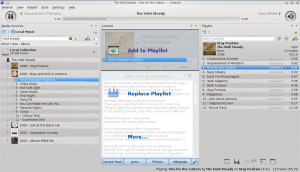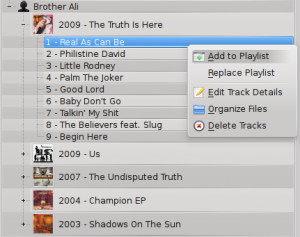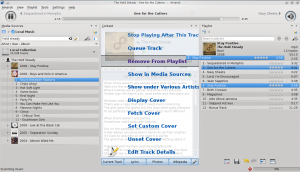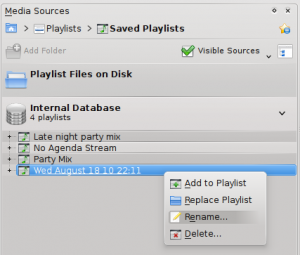Amarok/QuickStartGuide/Playlists/it: Difference between revisions
Created page with 'Questi pulsanti forniscono comode alternative a numerose azioni da tastiera.' |
Created page with 'Salvataggio e recupero delle tue scalette preferite' |
||
| Line 65: | Line 65: | ||
Questi pulsanti forniscono comode alternative a numerose azioni da tastiera. | Questi pulsanti forniscono comode alternative a numerose azioni da tastiera. | ||
=== | === Salvataggio e recupero delle tue scalette preferite === | ||
The disk icon (shown in the table above), at the bottom of your ''Playlist pane'', allows you to save the current Amarok playlist. This enables you to recall a particular selection of music from your collection at any time. Playlists only contain pointers to the music you selected, not the music itself. So if your playlist is pointing to music on an external device, it must be connected and mounted, otherwise the music cannot be played. There are three places to store playlists: | The disk icon (shown in the table above), at the bottom of your ''Playlist pane'', allows you to save the current Amarok playlist. This enables you to recall a particular selection of music from your collection at any time. Playlists only contain pointers to the music you selected, not the music itself. So if your playlist is pointing to music on an external device, it must be connected and mounted, otherwise the music cannot be played. There are three places to store playlists: | ||
Revision as of 17:35, 13 September 2010
Scalette
Il riquadro Scaletta
Dopo aver creato una collezione di musica, desidererai ascoltarla. Dunque crea una scaletta contenente la selezione dei brani che vuoi nel riquadro Scaletta. Questo è il posto dove puoi riprodurre la tua musica, i flussi o i podcast. Puoi ordinare la tua scaletta per titolo, album, artista, genere e molto altro. Per esempio puoi ordinare i tuoi brani prima per anno, poi per artista e così via.
La casella di ricerca ti permette di cercare o filtrare i tuoi brani. Le tue grandi frecce grige in alto nel riquadro Scaletta ti permettono di saltare al brano successivo o al precedente contenente le lettere da te scelte. La chiave inglese a destra ti consente di filtrare i brani per artista, album, ecc. La disposizione interna del riquadro Scaletta può essere modificata tramite il menu in alto: .
Aggiungere musica a una scaletta
Ci sono quattro modi per aggiungere musica alla scaletta nel riquadro Scaletta.

- Choose some of your music in the Content Browser, and drag it to the right. If you drag it over the Context pane you'll see the Pop-up Dropper, also known as PUD. The image above shows PUD in action. PUD provides three options: , , and . The option highlighted in a grey area ( in this image) is the active one. Dropping the album there adds it to the playlist in the Playlist pane. Choose one of the other options to do something else with your selection. Dragging it over brings up a new menu of choices in PUD.
- Trascina la tua selezione nel riquadro Scaletta nel lato destro della schermata di Amarok.
- Fai doppio clic sull'album/traccia che desideri trasferire nella scaletta.
- Right-click the album or track. In your right-click menu, you'll find similar choices. The image below shows the context menu that appears after an item (Brother Ali - Real As Can Be in this case) has been right-clicked. Select .

Utilizzare la barra degli strumenti
The Toolbar at the top of the Amarok screen provides a simple interface to control the playing of music in the playlist. Click the round icon on the left to start your music playing, and click it again to pause. On the right is the volume and mute control: click on the center of the icon to mute. Use your mouse scroll wheel to control the volume, or drag/click your mouse on the outside ring of the volume icon. Once a track or stream begins to play, the artist/album name/track title slowly alternates in bold in the center. On the right is the next track, which you can click to start it playing immediately. Once a track has played it will be on the left, so you can click on the title to go back to it. The progress bar in the middle of the Toolbar indicates the time elapsed (left hand) and time remaining (right hand) for the track that is currently playing. If you'd rather see a more traditional toolbar, you can select from the menu.

Manipolare le scalette
The most important manipulation you will probably perform on your playlist is to delete albums or tracks, to rearrange the displayed items for each track or to rearrange the display order of tracks.
Rimuovere una traccia
Puoi rimuovere qualsiasi traccia o album dalla tua scaletta:
- facendo clic destro sull'elemento nella scaletta e scegliendo l'opzione .
- Drag the item to be deleted over the Context pane to activate PUD. Several options will appear over the Context pane. Drag the item to the area marked . See the image below that shows a track being dragged onto the option in PUD.
- Selecting the track or tracks and use your Delete key. Multiple tracks can be selected using Shift or Ctrl.

You can undo your delete by pressing Ctrl+Z or by clicking the appropriate arrow in the Playlist Toolbar at the bottom of the Playlist pane (see below).
Utilizzare gli strumenti della scaletta in basso
In basso nel riquadro Scaletta ci sono sei icone:
Questi pulsanti forniscono comode alternative a numerose azioni da tastiera.
Salvataggio e recupero delle tue scalette preferite
The disk icon (shown in the table above), at the bottom of your Playlist pane, allows you to save the current Amarok playlist. This enables you to recall a particular selection of music from your collection at any time. Playlists only contain pointers to the music you selected, not the music itself. So if your playlist is pointing to music on an external device, it must be connected and mounted, otherwise the music cannot be played. There are three places to store playlists:
- outside Amarok on your computer file system,
- in your Amarok playlist database
- on an portable media device.
Clicking the disk icon at the bottom of the Playlist pane stores your playlist in the Amarok playlist database. By default, your saved playlist has a name composed of the date and time when you saved it (see image below). By right-clicking the playlist name, you can rename it to something more suitable. Right-clicking on a playlist name also allows you to add it to your existing playlist in the Playlist pane, or to replace your existing playlist.

